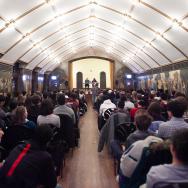For three hours, the usernames flitted up the screen. There were University of Chicago students, as always. But joining them were visitors from Texas and Arizona, from Ireland and Germany and Australia. There were teens, middle-aged men and women—and at least one septuagenarian.
This was the online debut for Night Owls, the popular philosophy discussion series started by Assoc. Prof. Agnes Callard. Since 2017, the UChicago scholar has operated the late-night, on-campus event, gathering hundreds to talk about everything from love and divorce to violence and death.
But as COVID-19 outbreaks forced the closure of UChicago and other universities across the country, Callard decided to push forward—ensuring that, in at least one part of student life, there would be “more instead of less.” As an experiment, she transformed Night Owls into a sort of online chatroom, expanding what had been a once-or-twice-per-quarter event into a weekly affair.
More than 600 people registered for the first session, entitled “Life Online: Community or Isolation?”
“It felt special,” Callard said. “People were really waiting for this. They were really excited. It was almost like a break in the clouds.”
Held April 9 with Prof. Patrick Jagoda, a scholar of video games and new media, the discussion touched on questions both big and small. How is loneliness different from being alone? In what ways have digital media and the internet changed the way we pay attention and communicate? What is your favorite video game?
Hosted on Crowdcast, the online conversation felt in many ways similar to the events Callard had organized on campus in the third-floor theater of Ida Noyes Hall. She and Jagoda talked for the first hour, then opened up the rest of the time to the audience. Instead of raising their hands, participants typed in questions that their peers could vote on.
Other things did change. Past Night Owls events, for example, had run until midnight. As the hours wore on, and the crowd thinned out, Callard could sense the mood of the room change—exhaustion and delirium setting in among the remaining die-hards.
Virtual Night Owls introduced a different dynamic, Callard said. The webcast began at 5 p.m. in Chicago, but because the audience was spread across time zones, people came and went more often, generating a sort of collective stamina.
In addition to the main discussion, the audience also carried on its own conversation in the Crowdcast chat module. The flurry of messages covered both the philosophical and the practical: One person would muse about the definition of community; another would ask for emails or Twitter handles to keep in touch after the event.
For William Weaver, the philosophy department administrator who co-runs Night Owls, the chat function channeled the same “boisterous energy” he always saw during the on-campus discussions—the passionate questions, the laughter, the high-fives. “This online conversational territory is a Wild West for intellectuals,” he said.
At times, the chat even pulled Callard’s attention away from Jagoda. Still, missing a few words or sentences was a worthwhile tradeoff. “It was nice to get a sense of what people were thinking about,” she said.
Midway through the session, one UChicago student asked about the steps that universities were taking to control their online classrooms, comparing the process to what a moderator might do for a game.
Jagoda agreed.
“When you move from a physical space to being online—if I’m with a group of people and overseeing a conversation or teaching, I’m less likely to be in my professor mode and more likely to be a moderator,” said Jagoda, who teaches in the Department of English and the Department of Cinema and Media Studies. “You’re moving around the pieces and foregrounding questions and curating the conversation. There are different forms of pedagogy that this format allows.”
Earlier in the session, he commented on another way that the coronavirus has altered public perceptions of virtual life. In May 2019, the World Health Organization added video game addiction to its list of diseases—officially listing it as “gaming disorder.”
But as the novel coronavirus spread around the globe this year, the WHO helped launch a campaign to encourage gaming, posing it as an alternative to in-person contact. While the about-face felt “opportunistic” to Jagoda, it nevertheless reaffirmed his conviction in the social benefits of video games.
“It’s the best way to stay social, all of a sudden,” he said. “I feel annoyed, but I also feel validated.”
Virtual Night Owls is scheduled every Thursday at 5 p.m. CDT through June 4. Upcoming guests include Northwestern philosopher Stephen White (“The End of the World?”), former UChicago Provost Daniel Diermeier (“Why Do Universities Matter?”) and Assoc. Prof. Kevin Hector of the Divinity School (“God”). Visit the Night Owls page on Crowdcast to register for new events, or to watch full recordings of past discussions.

